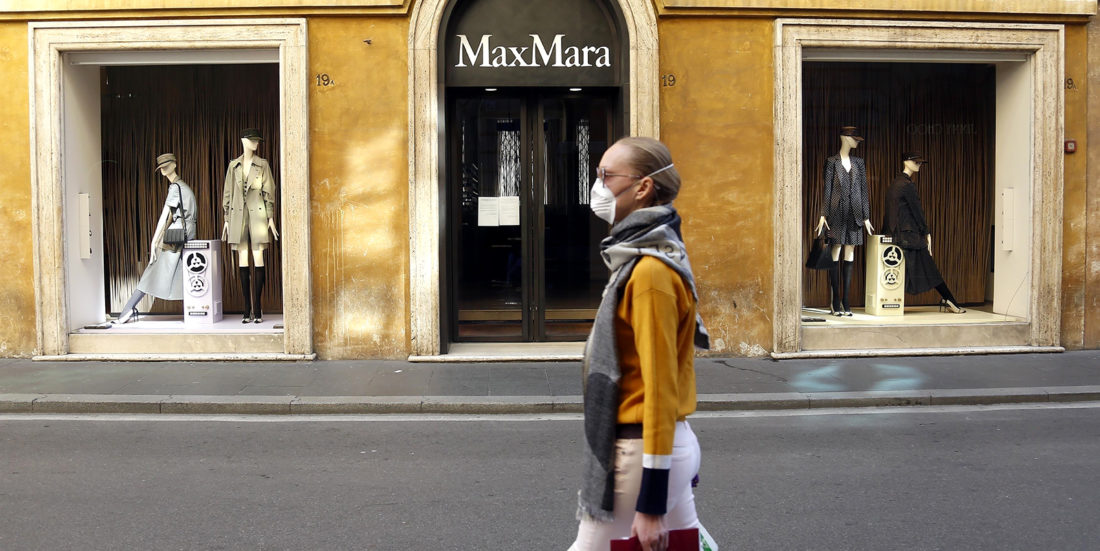Even Prada and Gucci are manufacturing health equipment now
Italy’s budget deficit is skyrocketing. Yet people there are not debating the cost of a human life, or whether the shutdown of the country is worth it.
Every day, hundreds of Italians end up in the sad statistics of the number dead. Shops and restaurants have been closed for several weeks. The streets are devoid of people.
We talked with associate professor Roberto Iacono at NTNU. He is a business economist, an Italian and an expert in Italian economics.
From an Italian point of view, what do you think of the economic debates we’ve been having in Norway?

When the crisis is over, the EU is likely to tighten the rules again. Then a new crisis could arise that becomes as severe as the pandemic, says Roberto Iacono, associate professor at NTNU. Photo: Private
“Both Sweden and Norway have had debates about the cost of the [COVID-19] measures and their benefits. No such debates have been happening in Italy. There, the human crisis quickly became severe. So far, Norway hasn’t been hit hard, and maybe that’s why a lot of people here are questioning whether the measures are worth it.”
Mostly elderly people are dying. What status do the elderly have in Italy?
“Older people have a higher status than in Norway. It’s conceivable that this plays into the debate. In Italy, the elderly have a more central role and wield greater power in the population than in Norway. Italy is a more hierarchical society, and older people are a reference point for lessons learned.”
Shops and restaurants have been closed for several weeks in Italy. The streets are empty. What is the status of the Italian economy now?
“Italy as a country is very divided between the north and the south. The crisis has hit the northern part of the country. Relatively few people are ill in the south. The north is the most resource-rich part of the country with a lot of business and industry. This is where the money is made. That’s why the country has been hard hit financially. The factories were open until just a few days ago, but now most of them have closed.
“The economy is highly uncertain, but a lot of sectors are doing well, like food products, health equipment manufacturing and the like. Many people have also restructured their production to help support health needs. Production is in high gear. Even Prada, Gucci and Ferrari are participating. Major industrial volunteer efforts are taking place in Italy.”
In Norway, a lot of people work from home offices. Is that also the case in Italy?
“A lower percentage of Italy’s workforce is able to work from home. This is due to two things. One is that the broadband capacity is significantly lower than in Norway. The second is that working life in Italy is based less on smart forms of collaboration. The situation in Italy is serious and the uncertainty itself creates problems. No one knows when regular consumers will be able to return to their normal consumption patterns.”
What are the Italian authorities doing to help Italian businesses?
“A package called ‘Cure Italy’ has been launched. The Italian government issued the decree, worth 25 billion euros. It’s a powerful crisis package, but it probably won’t be sufficient. The situation is bound to continue for quite a few weeks. At the start of the crisis, there was a lot of unrest about whether the EU would support Italy. Now that’s happening by temporarily repealing the Stability and Growth Pact between EU member states that limits government deficit spending. Italy will have a huge deficit this year and has been allowed by the EU to do so. Without the EU, Italy would probably have major problems in servicing the debt.”
What rights do Italian workers have with regard to unemployment benefits and social security benefits?
“Italy has robust layoff measures where you continue to receive 80 per cent of your salary. It’s also possible to get 15 days of crisis parental leave with pay for children under age twelve. The Italian welfare state is really not that bad. The problem in Italy is that a large part of the economy is informal, and so it isn’t covered by the measures in the same way. A lot of people don’t have decent contracts. I’m thinking here of working conditions like Foodora [online food delivery], where you get paid through an app, but if no one orders, you don’t get paid. These are working conditions that aren’t covered by the crisis package, so these people are getting hit really hard.”
What is happening to the country’s black economy?
“In my opinion, it’s fine if the part of the economy related to criminal activity is struggling. I’m mostly thinking of the import and sale of drugs which have greatly decreased now. Unfortunately, history has shown that the Mafia has made a lot of money in crisis situations. In times of crisis, the state has to buy and order things quickly, and often doesn’t have the time to go through regular bidding rounds. The Mafia and other criminals have previously benefitted when the caution level is lower because they were able to make good offers, and quickly.
“The Mafia pervades the entire Italian economy, but especially in the south. Southern Italy was ruled by Spanish kingdoms for many years. They haven’t undergone any liberal reforms like the north has done, and the south has long been ruled in a way that isn’t forward looking. The south has a lot more poverty, and Italy as a state is not able to counteract it. The country is divided and seems to be staying that way.”
Which industry will mean the most for Italy in the future?
“This is a temporary crisis, and I don’t think it will lead to any major changes over time. Italy’s economy is more diverse than Norway’s, where the economy is based on commodity exports. In Italy, tourism, car production, ICT, clothing, pharmaceuticals and the food industry are important for the country. The structure in Italy is varied and very good.”
Is it possible to see any positive effects when it comes to the financial situation?
“Paradoxically, you can find some good effects through stock market declines and wealth reductions like we’re experiencing now, since that leads to a more even distribution of capital income in the population. Historically, pandemics like the Spanish sickness that led to very high death rates, have been significant for distribution because they reduce inequalities by decreasing the number of workers, and wages go up.
Italy has had a debt-heavy economy. Now you have this crisis as well. What do you think of the prospect ahead?
“EU support for lifting strict rules that limit public spending means that Italy can run a deficit. When the crisis is over, the EU is likely to tighten the rules again. Then a new crisis could arise that becomes as severe as the pandemic. It’s risky to implement austerity measures when the economy is on the rise. Support for the EU has been at a low ebb for several years, and the corona crisis is another crisis for the EU. We’ll just have to wait and see how the situation develops and whether Europe can stand together in the crisis.”





